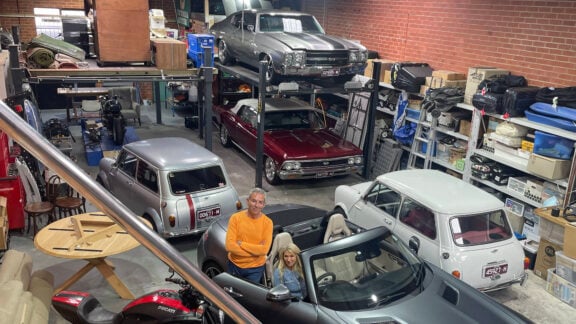Julian Hill described the Multicultural Framework Review as “a most serious and thoughtful body of work, and the deepest examination of multicultural policy settings in a generation.”
The Assistant Minister for Citizenship and Multicultural Affairs in drew attention to the social cohesion reported by the Scanlon Foundation, which he said, showed “optimism and pride in our country as Australians, and it reminds us that we have far more in common than we have differences despite our great diversity and all the pressures and strains.”
He added that despite “overseas conflicts over the last 12 months, social cohesion has held steady and remains strong, as 85 per cent of Australians believe that our multicultural society has been good for Australia.”
Neos Kosmos asked whether the pressure to reduce migration, given its economic imperative, stems from economic concerns and a lack of housing.
“If you look through modern Australian history over 100 years, whenever there are cost-of-living pressures, economic pressures, and past recessions, you find naturally that public attitudes to migration change,” Hill said.
Migration to serve the national interest
“Our migration programme must always serve our national interest, the economic interests of the country, and the social interests of Australia,” he said, adding that it is important to balance “skilled migration, family migration, and humanitarian migration.”
Hill acknowledged that cost-of-living pressures are reflected in the report, stating, “We’ve observed that people want to see migration reduced, and the government’s been saying that there’s a convergence between post-pandemic migration growth.”
“I’m not criticising the former government for opening the borders post-pandemic. There was a lot of pent-up demand, a lot of international students ready to come back, and many loved ones—partners, husbands, wives of Australians—waiting offshore ready to come onshore.
“There were also many Australians waiting to return, which adds to net overseas migration numbers. So, I’m not criticising the former government for opening the borders—but what we’ve seen is a level of migration that is simply too high,” Hill said.
Housing is “one part of it,” he said, and added, “We don’t blame immigrants for housing problems solely”.
“The fact is housing pressures have built up over 30 years because, as a country, we’ve not been building enough houses.
“Ultimately, the answer to housing affordability is supply; it’s building more houses, and that’s what the government is focused on.”
Migration by former LNP government was like Wizard of Oz
He went on to criticise the former LNP government for what he described as a “broken migration system with no policy or strategy, no enforcement.”
“It was like the Wizard of Oz—you lift the curtain, and there’s nothing there. That’s what we inherited in the Department of Home Affairs: 1,000 public service jobs gone, a black hole in the department with over a million visa and citizenship applications backlogged, and no policy or strategy to serve the national interest.
“So, we’ve tried to restore integrity to that, rebuild the department, and rebuild a programme that serves our national interest,” Hill said.
Overseas conflicts spill over in our streets
Jewish media representatives noted that regardless of the report’s positive appraisal of social cohesion, antisemitism levels have never been worse in Australia. The journalist referenced the incident on Wednesday, in Sydney’s eastern suburbs where cars were burned, and properties and a restaurant were defaced with anti-Israel slogans.
Hill said the incident was “appalling” and “completely unacceptable.”
“It is not the sort of thing anyone wants to tolerate in modern Australia. To single out anyone because of their religion, ethnicity, or identity is unacceptable,” he said.
“The report does show over the last 12 months that there’s been an uptick in negative attitudes towards Jewish Australians and Muslim Australians,” he added.
Hill emphasised that the Prime Minister and the government have been “resolute” in addressing the increase in antisemitism.
Multicultural media: A cornerstone of belonging
On the issue of independent multicultural media, referenced in the Multicultural Framework Review, Hill said he had met with Independent Multicultural Media Australia (IMMA) and that the government endorsed the review’s view that such media underscores “the four core principles of connection, inclusion, belonging, and identity.”
“The review’s recommendations on independent multicultural media are continuing to impact our thinking, and they’ll flow through into budget processes in the coming years.”
He noted that responsibility also lies with the Minister for Communications, Michelle Rowland, with whom he has been discussing these issues.
“At the moment, I don’t have a specific answer, and I’m not going to pre-empt announcements that the Communications Minister and others may have.”
Neos Kosmos emphasised how independent multicultural media can limit the impact of overseas conflicts and promote greater social cohesion.
“Independent multicultural media outlets are trusted voices in the community – so, the continued vibrancy, viability, and diversity in our multicultural media landscape is incredibly important for a range of policy objectives that the report and framework review refer to,” Hill said.
He stressed that “Australians do not want foreign conflicts, or political leaders who seek to profit from division.” Hill then criticised the Greens’ Deputy Leader, Mehreen Faruqi for “talking dismissively about that nonsense of social cohesion.”
“I reject that, and I think the vast majority of Australians value social cohesion. At times, we need to rediscover the art of disagreeing agreeably,” Hill said.
Hill then took a swipe at Opposition Leader, Peter Dutton, stating that his “main legislative priority” in the last LNP government, alongside former Prime Minister Scott Morrison, was to block Section 18C of the Racial Discrimination Act.









